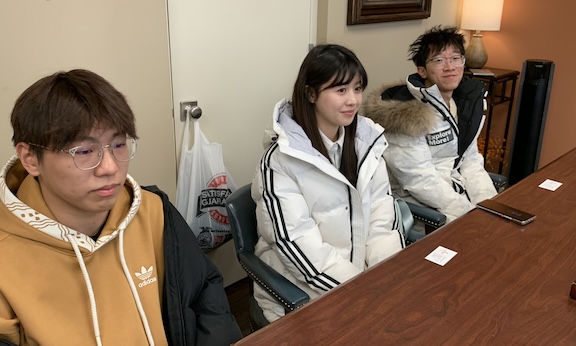In a world connected in innumerable ways, Campbell University is forging meaningful international partnerships.
Those connections and exchanges span cultures, educational opportunities and economies. One of the most promising is a growing relationship between Campbell’s College of Pharmacy & Health Sciences (CPHS) and Shenyang Pharmaceutical University (SPU) in Shenyang, Liaoning Province, China.

The Department of Pharmaceutical & Clinical Sciences (PCS) in early January played host to three undergraduate students and a program director from SPU. The 10-day visit was part introduction, part learning experience and part recruitment exercise, with an overarching aim for Campbell to extend its global reach.
In this case, it was giving the Chinese students insight into the pharmaceutical industry in the U.S. and opportunities for them here. They learned more about our Master of Science in Pharmaceutical Sciences (MSPS) program, career opportunities of our MSPS graduates and the study environment at Campbell.
Throughout the visit the Chinese students toured campus, sat in on lectures, participated in lab experiments, experienced activities of the Pharmaceutical Education & Research Center (PERC), visited Research Triangle Park and companies such as Pfizer and Novo Nordisk. The group also traveled to Charlotte for an NBA game, sampled American food, and learned about one another — their differences and similarities.
Dr. Jinsong Hao, professor of Pharmaceutical & Clinical Sciences at CPHS, is a graduate of SPU.
Hao was integral in establishing the connection.
“If it wasn’t for Dr. Hao it would never have happened,” Dr. Charles A. Carter said about the partnership. He is professor and chairman for Pharmaceutical Clinical Sciences at CPHS.
Hao said, “The partnership is and remains a work in progress. Shenyang Pharmaceutical University is recognized globally as a premier institution teaching pharmaceutical sciences.”
Shenyang and Campbell, which is trying to grow its international student community, are a good fit.
Hao sees more collaboration between the schools in the future.
“We really want them to come to see our teaching, our working environment and how our students work in the industry,” Hao said.
Carter said, “The Chinese collaboration aligns with a university strategy centered on working with other countries in South America, other parts of Asia, Europe and Africa.”
“I believe that science is global,” Carter said. “I feel improvement to one’s healthcare is global, too, and I’ve always been interested in that. Based upon my current and prior experiences, we are an international community.
“I have sought out and will continue to seek out countries outside the United States, where Campbell can come alongside — either to educate students or to develop faculty through scholarship and research,” he said.
Guy Armstrong has traveled to China dozens of times, and he has hosted Chinese students at Campbell. Armstrong, who is the international coordinator for Global Engagement and instructor at Campbell, has throughout his career facilitated “voluntourism” trips, around the world, primarily to China and India.
He sees the partnership as a means of exchange, as a chance to build bridges beyond ideologies and rising political contentions. China, Armstrong says, encourages its students to learn and work in the U.S., for instance, with the goal of returning to China to implement those skills and experiences.
“We have such a rich area for pharmaceutical sciences,” Armstrong said, “so it was good for them to see these are the kind of jobs you might be able to get if you came to school (at Campbell).”
Campbell has a diverse and talented faculty, which benefits current students as well as university efforts to recruit internationally. The Chinese students, their hosts said, enjoyed visiting Campbell for myriad reasons.
They said it’s tranquil and bucolic. They felt safe in Buies Creek, comparing and contrasting a country setting to bustling New York City and parts of New England, which they also visited on the trip.
“The visitors,” Hao said, “enjoyed the interactive style of teaching they saw and experienced at Campbell, seeing a quiet and welcoming place to learn.”
“The faculty at CPHS is passionate, excited about teaching and learning,” Hao said. “Our students didn’t hesitate to ask questions in the classrooms and in the lab.”
“They just jumped in,” said Armstrong, remembering their skills and comfort in handling mice and other aspects of lab work. “They were loving it.”
“I think that they left understanding that Campbell University is a very safe campus,” Carter said. “We are a teaching institution. We are equipped with many resources, and we’re surrounded by an industry that extends within their native borders.”
“Some students will get a Ph.D. and continue their research,” Carter said.
“But another large segment of those students studying Pharmaceutical Sciences as undergraduates are seeking to obtain a skill-based curriculum that prepares them for employment within the pharmaceutical or biopharmaceutical industry. That’s where we step in,” Carter said.
“I think that the SPU director of International Affairs went home with an understanding that this is an area that students from his university could acclimate or assimilate into our student body, largely because of the intent of the university, the leaders of the college, the faculty within the department … and seeing firsthand that we already have students from other countries.
This, the Campbell groups say, marks the start of a partnership rich in opportunities that will continue to flourish, impacting all aspects of the Campbell University community and beyond.
“We’re planting a seed that will not take long to grow,” Carter said.

